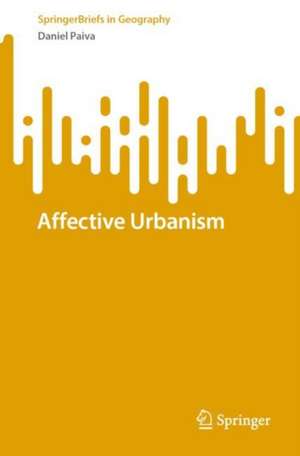Affective Urbanism: SpringerBriefs in Geography
Autor Daniel Paivaen Limba Engleză Paperback – 5 sep 2024
The book is mainly targeted to researchers, postgraduate students, and practitioners. The topic of affective urbanism is of interest to scholars in urban studies, architecture, geography, anthropology, and sociology.
Din seria SpringerBriefs in Geography
-
 Preț: 377.18 lei
Preț: 377.18 lei -
 Preț: 380.63 lei
Preț: 380.63 lei -
 Preț: 381.98 lei
Preț: 381.98 lei -
 Preț: 379.09 lei
Preț: 379.09 lei -
 Preț: 380.25 lei
Preț: 380.25 lei -
 Preț: 381.98 lei
Preț: 381.98 lei -
 Preț: 411.32 lei
Preț: 411.32 lei -
 Preț: 314.59 lei
Preț: 314.59 lei -
 Preț: 340.12 lei
Preț: 340.12 lei -
 Preț: 376.22 lei
Preț: 376.22 lei - 15%
 Preț: 469.09 lei
Preț: 469.09 lei -
 Preț: 376.22 lei
Preț: 376.22 lei -
 Preț: 345.52 lei
Preț: 345.52 lei -
 Preț: 377.35 lei
Preț: 377.35 lei -
 Preț: 376.22 lei
Preț: 376.22 lei -
 Preț: 347.31 lei
Preț: 347.31 lei -
 Preț: 411.93 lei
Preț: 411.93 lei -
 Preț: 377.35 lei
Preț: 377.35 lei -
 Preț: 378.92 lei
Preț: 378.92 lei -
 Preț: 350.65 lei
Preț: 350.65 lei -
 Preț: 377.73 lei
Preț: 377.73 lei -
 Preț: 379.09 lei
Preț: 379.09 lei -
 Preț: 376.80 lei
Preț: 376.80 lei -
 Preț: 376.80 lei
Preț: 376.80 lei -
 Preț: 347.74 lei
Preț: 347.74 lei -
 Preț: 376.22 lei
Preț: 376.22 lei -
 Preț: 378.54 lei
Preț: 378.54 lei -
 Preț: 338.70 lei
Preț: 338.70 lei -
 Preț: 414.21 lei
Preț: 414.21 lei -
 Preț: 379.68 lei
Preț: 379.68 lei -
 Preț: 378.34 lei
Preț: 378.34 lei -
 Preț: 384.86 lei
Preț: 384.86 lei -
 Preț: 342.20 lei
Preț: 342.20 lei -
 Preț: 377.57 lei
Preț: 377.57 lei -
 Preț: 343.83 lei
Preț: 343.83 lei -
 Preț: 377.35 lei
Preț: 377.35 lei -
 Preț: 350.81 lei
Preț: 350.81 lei -
 Preț: 378.92 lei
Preț: 378.92 lei -
 Preț: 353.36 lei
Preț: 353.36 lei -
 Preț: 375.62 lei
Preț: 375.62 lei -
 Preț: 149.55 lei
Preț: 149.55 lei -
 Preț: 378.12 lei
Preț: 378.12 lei -
 Preț: 347.31 lei
Preț: 347.31 lei -
 Preț: 376.43 lei
Preț: 376.43 lei -
 Preț: 413.63 lei
Preț: 413.63 lei -
 Preț: 376.43 lei
Preț: 376.43 lei -
 Preț: 344.52 lei
Preț: 344.52 lei -
 Preț: 378.71 lei
Preț: 378.71 lei -
 Preț: 378.12 lei
Preț: 378.12 lei
Preț: 349.97 lei
Nou
Puncte Express: 525
Preț estimativ în valută:
66.96€ • 70.11$ • 55.41£
66.96€ • 70.11$ • 55.41£
Carte disponibilă
Livrare economică 17-31 martie
Preluare comenzi: 021 569.72.76
Specificații
ISBN-13: 9783031645068
ISBN-10: 3031645065
Ilustrații: XV, 110 p.
Dimensiuni: 155 x 235 mm
Ediția:2024
Editura: Springer International Publishing
Colecția Springer
Seria SpringerBriefs in Geography
Locul publicării:Cham, Switzerland
ISBN-10: 3031645065
Ilustrații: XV, 110 p.
Dimensiuni: 155 x 235 mm
Ediția:2024
Editura: Springer International Publishing
Colecția Springer
Seria SpringerBriefs in Geography
Locul publicării:Cham, Switzerland
Cuprins
Chapter 1. Introduction: affective urbanism and the urban experience.- Chapter 2. The limits of affective urbanism.- Chapter 3. Urban curation and experience co-creation in the city.- Chapter 4. Conclusion: affective urbanism and the right to the city.
Textul de pe ultima copertă
The book poses key questions on the contemporary practices of experience-oriented urbanism from the perspective of the affective turn. Departing from a critique of the imposition of the experience economy on contemporary urbanism, the book seeks alternative narratives and praxis for the co-creation of experiences in the city by looking at how different urban curators play with rhythms, atmospheres, and worlds to improve their communities. In this sense, the book offers practical pathways for urbanists interested in using experience co-creation as a tool for fostering communities and fulfilling the right to the city.
The book is mainly targeted to researchers, postgraduate students, and practitioners. The topic of affective urbanism is of interest to scholars in urban studies, architecture, geography, anthropology, and sociology.
The book is mainly targeted to researchers, postgraduate students, and practitioners. The topic of affective urbanism is of interest to scholars in urban studies, architecture, geography, anthropology, and sociology.
Caracteristici
Provides the first critical overview on affective urbanism Situates affective urbanism within debates on the right to the city Explains the benefits of incorporating the notion of urban curation into affective urbanism
